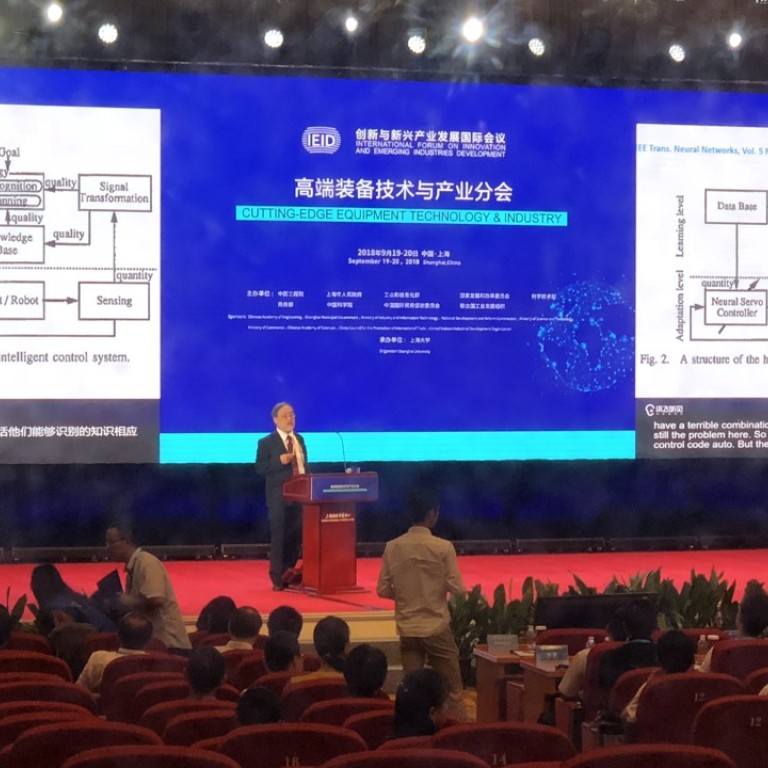
National AI champion iFlytek in dispute over ‘automated’ speech translation at Shanghai forum
Chinese voice recognition technology provider iFlytek was drawn into a dispute with an interpreter working at a recent high-profile conference, who accused it of passing off his translation as something done entirely by artificial intelligence (AI), an accusation that the company denies.
Shenzhen-listed iFlytek said it has the technology to do simultaneous translation without need for human interpreters, but the service it provided at the 2018 International Forum on Innovation and Emerging Industries Development in Shanghai last week was for real-time transcription and billed as such.
The controversy went viral in China on Friday, following a post on the Quora-like question-and-answer platform Zhihu, where the interpreter Bell Wang accused the company of “stealing” his transcript at the conference and labelling it as the result provided by a live machine translation.
“It was an outright lie,” Wang wrote in his Zhihu post on Friday. “The day may come when AI can actually understand natural languages and we lose our jobs, but it’s definitely not now.”
In a post on Monday amid the speculation surrounding the dispute, Wang wrote that an iFlytek manager had reached out to him to explain that the conference used the company’s transcription service, which combined machine and human translation, and not its AI-based simultaneous translation system.
A photo from the conference had a screen behind an unidentified Japanese professor making a presentation showing simultaneous Chinese and English-language translation.
Wang wrote that the issue could be avoided in future by presenting the name and photo of interpreters at similar events to give credit to their work.
In a statement on its official WeChat account, iFlytek dismissed speculation that it provided a bogus service at the event in Shanghai. “The organisers of the conference, including the Chinese Academy of Engineering, all confirmed that iFlytek did not make any false claim,” the company said.
Wang declined an interview request made via private message on Zhihu, while iFlytek said they had no further comment beyond its published statements.
The iFlytek dispute drew widespread public scrutiny in China as it came on the heels of the revelation made last month by the founder and chief executive of start-up Redcore, who admitted that the Beijing-based firm’s “home-developed” web browser was based on Google’s Chrome technology.
It was a “farce” that exposed abuse of the “independent innovation” and pursuit of rapid success in China’s tech industry, state media warned in a commentary days after the admission made by Redcore’s Chen Benfeng.
That also added to the growing debate about China’s overblown technological strength, and draws comparisons to false claims of breakthroughs in the past, including the case of Hanxin, in which a professor sanded down Motorola chips to pass off as his own innovation.
Liu Yadong, chief editor of the state-backed Science and Technology Daily, who cited China’s lack of scientific spirit despite a century of trying, had sparked national soul-searching a few months ago after criticising the media of hyping up China’s strength in technological innovation.
The development of AI – comprising technologies which perform tasks that are characteristic of human intelligence, such as understanding language and recognising objects and sounds – has been one of the priorities of China’s national strategies since July last year.
China’s State Council has laid out a three-step road map to AI supremacy, including building a domestic AI industry worth about US$150 billion and to make the country an “innovation centre for AI” by 2030.
Founded in 1999 and headquartered in Hefei, capital of the eastern province of Anhui, iFlytek has established itself as the country’s foremost developer of advanced speech recognition, speech evaluation and natural language processing technologies.
The company was named along with Baidu, Alibaba Group Holding and Tencent Holdings as the government’s first batch of national champions tasked with driving AI development in the country. Alibaba is the parent company of the South China Morning Post.

